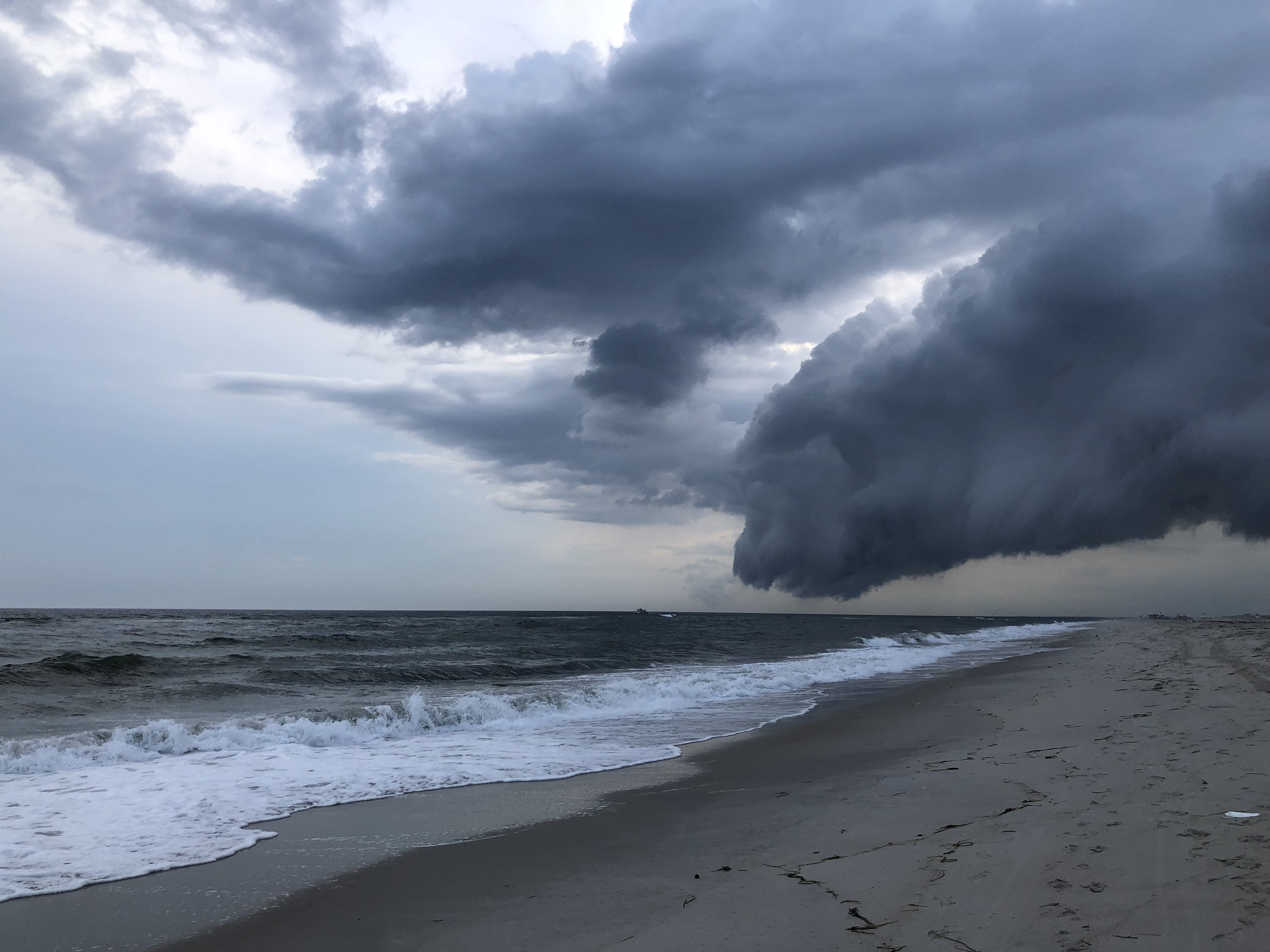Uncertainty and Change – Velleda C. Ceccoli
I took this photograph during one of my evening conversations with the ocean. It had been a beautiful day, sunny and bright, when I had set off on my daily meditation with my old friend O (for ocean, although perhaps also for the Bionian O). As I walked by the waters edge, feet in the wet sand and eyes engaged with the waves, I witnessed a magnificent transformation. Of the kind that fills you with the knowledge that there is something bigger than you, MUCH bigger. Nature can do that.
The sky filled with grey, dark blue and inky black clouds overtaking the sun and rousing the sea. A storm was in the making, and at any moment the clouds and the sea would become one indistinguishable fury, pounding away at the sand and swelling to great heights toward the sky. In awe I stood rooted to the spot, enacting my own version of the uncertainty principle: position and momentum not quite telling the whole story. The missing quantum particle being my in-the-moment lived experience. Feeling terrified and blessed, I was clear in the knowledge that something of epic proportions was in the making, that despite my love affair with the sea it could reach out and swallow me up, and aware that I was witnessing the force of nature. A thunderous reminder of the uncertainty of life and the fact that everything can change in an instant. And that turbulence is part of change.
While as psychoanalysts we are familiar with the uncertainty that accompanies personal change, over the past three and one-half months (and more and more) we have been facing a different type of uncertainty – the existential kind. The kind that O reminds me of in whispers and thunderous waves. What we are being asked to hold, for our patients, our loved ones and ourselves is a sort of not knowing that has shaken us into a lived awareness of our fragility, humaneness, and connection as well as the need for change and transformation.
The world at large is being exposed and called out as white and privileged, unfair, racist and blind to the way that the treatment and experience of otherness and difference, including violence masquerading as law and order, are embedded in our cultural ethos. Psychoanalysis is part of that ethos. Our PD community is as well. We cannot escape it but we can question and actively rethink it. As psychoanalysts we must be interested not only in the way that otherness is manufactured, experienced and understood but also in the way that it implicates and actively engages us in generational, historical and relational dialogues – if we can make the space for them.
The psychoanalytic container holds us and others, doctors and patients and citizens. All of us, together. Today we have the opportunity to shift the normative unconscious (Layton,2006) of psychoanalysis and of our analytic community. A necessary shift that prioritizes change and transformation and makes space for dialogue, thought and action between all of its members, and the totality of the community that it creates and “contains”. Our psychoanalytic ‘container’ requires ongoing attention, repair, renovation, disruption, creation and re-creation. Perhaps it even requires a revolution. We must continue to push the boundaries off center, and open spaces to think, theorize and converse that invite difference and the way that it is lived. We must do that now both as a necessary protest in the service of identity and self-creation and in the service of remaining active listeners and narrators of the unconscious as a free zone, precisely because the dominant discourse does not make room for this. We must envision a narrative language that is both flexible and resistant in order to negotiate identity, difference, privilege and inequality across the conscious-unconscious membrane.
I am ever grateful for being part of the NYU Post Doctoral community, there is much to be done together.
A final thought from James Baldwin:
We’ve got to be as clear headed about human beings as possible, because we are still each others only hope.
References:
Baldwin, J. (1971) A Rap On Race. with Margaret Meade. PA: Lippincott.
Layton, L. (2006) Racial Identities, Rachial Enactments, and Normative Unconscious Processess. Psychoanalytic Quarterly, LXXV, (1), 237-269.
________
Velleda C. Ceccoli , PhD. – Executive Committee, NYU Postdoc; on the faculties of the NYU Postdoctoral Program in Psychotherapy and Psychoanalysis, The Stephen Mitchell Center, The Institute for Relational and Self Psychologies in Milan, Italy, and the American Academy of Psychoanalysis. She is also on the editorial boards of Psychoanalytic Dialogues and Studies in Gender and Sexuality. She writes the ongoing psychoanalytic blog Out of My Mind, and has published a number of journal articles on language, trauma, dissociation, sexuality, gender and erotic experience. She maintains a private practice in New York City, New York.

